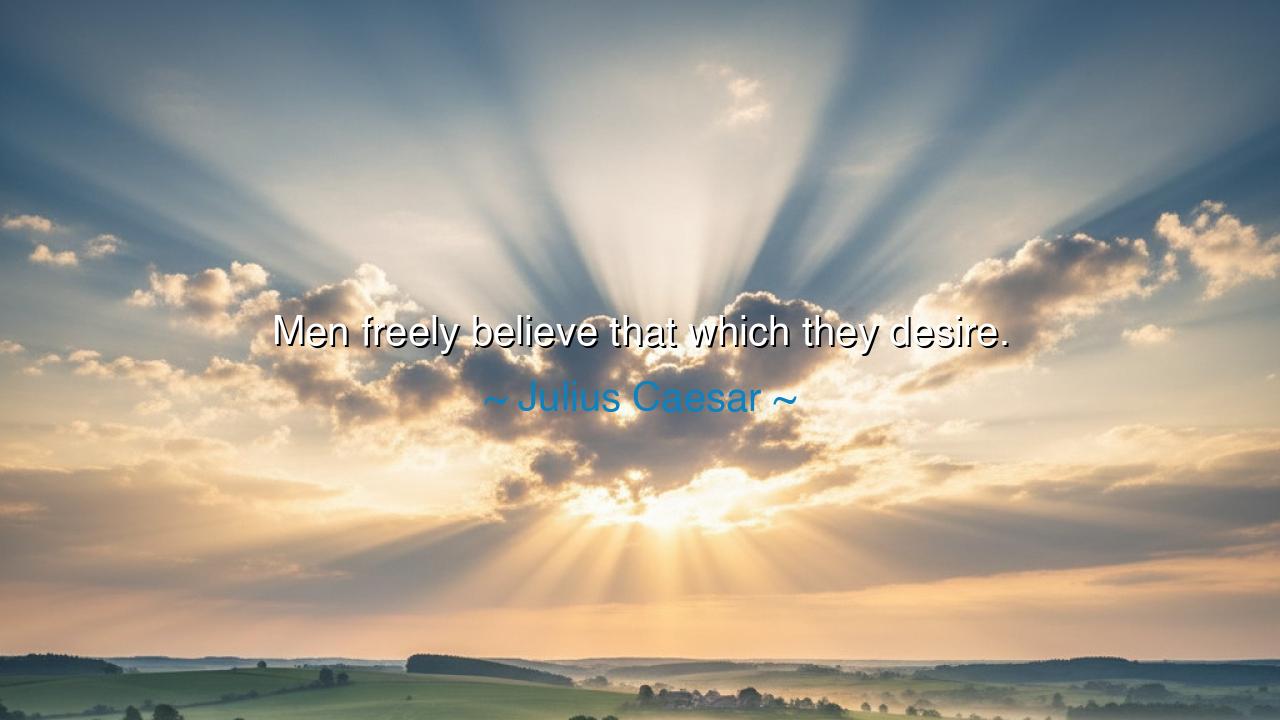
Men freely believe that which they desire.






Hear this, O children of wisdom, for the words of Julius Caesar carry the weight of truth and the wisdom of ages. He once declared, "Men freely believe that which they desire." These words reveal a deep understanding of human nature—a nature that is often governed by emotion, desire, and the forces of the heart, rather than the clarity of reason or the cold logic of facts. It is a reminder that our beliefs are not always shaped by the truth, but by the longings of our souls. Desire, Caesar teaches us, has the power to cloud our judgment and to lead us astray, and it is in the recognition of this truth that wisdom lies.
In the ancient world, where men and women often sought answers from the gods and from the cosmos, it was easy to see how belief could be guided by desire. The Greeks were a people full of desire—not just for wealth or power, but for understanding and truth. They built temples and made sacrifices in hopes of appeasing the gods, but in many ways, their beliefs were shaped not by the truth of their circumstances, but by what they desired to be true. Socrates, for example, spoke of the need to question everything, to seek knowledge and truth rather than clinging to the comforts of accepted beliefs. And yet, even he was not free from the human desire to hold onto what he wanted to be true.
The great empires of history, too, were built upon desire. Alexander the Great, whose conquests stretched across continents, desired nothing less than the domination of the known world. His belief in his own destiny as the conqueror of the earth was not rooted in the realities of governance or the practicalities of empire, but in the desire for immortality and glory. His belief in his divine right to rule shaped his actions, and in many ways, it was his desire for power that led him to push beyond his limits, sometimes to his own destruction. The ancient Romans, too, under Julius Caesar's leadership, believed in the glory of conquest and the superiority of their empire—beliefs deeply shaped by the desire for dominance and honor.
Consider, too, the story of Napoleon Bonaparte, a man driven by the desire for greatness, for glory, and for a legacy that would rival that of the greatest conquerors in history. Napoleon, like Caesar, believed in his own destiny. His desire to shape Europe according to his will led him to wage war across the continent, driven by a belief that he was meant to bring order and power to a fractured world. Yet, his desire blinded him to the realities of war, to the limits of his power, and ultimately led to his downfall. His desire to be seen as the greatest ruler led him to disregard the wisdom of humility and the need for reflection.
The words of Caesar remind us that our desires are not always in alignment with the truth, and that belief can be easily manipulated by our own desires. It is in this recognition that we must be vigilant—desire often distorts the way we see the world, and we must strive to see with clarity, to seek not what we wish were true, but what is truly so. Just as Caesar built his empire upon his own beliefs, driven by his desire for greatness, so too can we find ourselves acting on desires that cloud our vision and shape our decisions in ways that may lead us astray.
The lesson of Julius Caesar is clear: to believe is not to blindly accept what we want to be true, but to seek the truth in all things, no matter how uncomfortable it may be. We must guard against the power of desire, for it is in the pursuit of our deepest wishes that we often lose sight of what is real. Desire is a force that can either propel us to greatness or lead us to ruin, depending on how we channel it. We must ask ourselves: are we believing because of the truth, or because of what we wish the truth to be?
So, O children of the future, take this wisdom to heart. Question your desires, for they have the power to shape not only your beliefs but your actions. Seek to understand the world not through the lens of your wants, but through the clarity of truth. Know that belief without reflection can lead to great harm, both to yourself and to others. Strive to see the world as it truly is, not as you wish it to be, for it is only in the pursuit of truth that you will find true wisdom, and in this wisdom, the path to greatness.






AAdministratorAdministrator
Welcome, honored guests. Please leave a comment, we will respond soon